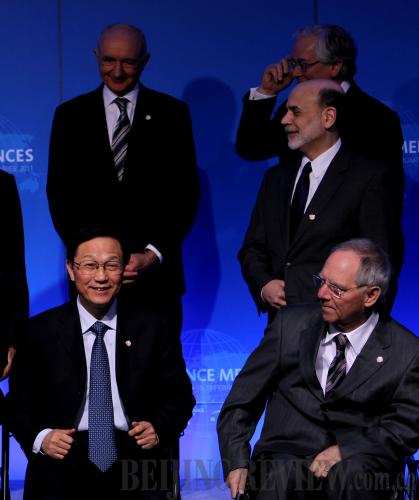|
 |
|
FINANCIAL GATHERING: Chinese Finance Minister Xie Xuren (front left) at the meeting on February 19 (GAO JING) |
After the Paris meeting, G20 finance ministers and central bank governors will hold two more meetings in Washington, D.C. in April and September. Then in October, they will meet in Paris again to make final preparations for the G20 Summit in Cannes in November. If they can seize the opportunities to reach consensus on the five topical issues, they will give people new confidence and hope for the world economy.
China's choice
The Paris meeting reached an agreement on indicators for measuring global economic imbalances. Credit for this achievement should be given to the active and practical attitude of the participants.
Before and after the meeting, some Western media outlets analyzed the divergence between France and China regarding the reform of the international monetary system. They pointed out Chinese policy-makers have avoided discussing the reform from a "political" angle; instead, they prefer discussing it from a "technical" perspective.
Indeed, the reform of the international monetary system should not be a topic for political hype. The Chinese economy's excellent performance in the global financial crisis and its replacing Japan as the world's second largest economy have boosted China's influence in the global economy. Chinese policy-makers tend to regard the reform of global economic and monetary systems as a technical problem. In their view, China should not hastily push for radical reforms before developing a good understanding of the systems.
Debates on the status of the U.S. dollar and the design of new systems are a good example. Many in China think the U.S. dollar and the U.S. economy will remain dominant in the short term. It is difficult to shake their status. Therefore, a prudent reform strategy not only can reduce the suspicion of the United States, but also helps promote the realization of concrete results in the reform.
Of course, the huge challenges in China's economic and social transitions are also reasons for Chinese leaders' practical and prudent attitude. A good knowledge of China's domestic challenges can help understand the stance of Chinese policy-makers.
For instance, the Chinese economy is at a critical stage in transforming its development pattern. China aims to change its excessive dependence on exports by enhancing domestic demand's contribution to the economy. The Chinese Government is trying to accelerate the transformation process. But this goal is obviously difficult to achieve in the short term.
In the meantime, inflation, represented by high property prices and high consumer prices, is hindering progress in the reform of China's exchange rate regime. The country must first properly deal with the problem of inflation. In theory, the appreciation of the yuan is conducive to curbing inflation, but in reality, an excessively quick appreciation may lead to economic difficulties.
Based on global economic realities and China's domestic challenges, China has reason to adopt a prudent and practical attitude toward the G20 agenda. Currently, it is feasible for China to seek solutions to issues such as the reform of the international monetary system from a technical aspect. This approach is also conducive to the steady growth of the global economy and strengthened international cooperation. Therefore, China-France differences on the G20 agenda should not be exaggerated.
Incremental progress
We can continue to expect more progress in the five major topics mentioned above, especially in increasing the voice of developing countries in the international monetary system and curbing the rise in global food prices. To some extent, it is easier to reach agreements on these issues.
In the meantime, we should keep a clear mind regarding the following fact: It is extremely difficult to realize radical structural reform due to the complex interdependence among different economies and the conflicting interests of different stakeholders. Due to political reasons, many participants at the Paris meeting were still accustomed to blaming their policy failures on other countries. This practice added to the difficulty of international cooperation.
Given these factors, we should not expect too much of the G20 discussions. Under the current complicated global economic circumstances, G20 members have conducted policy consultation and coordination, while upholding existing rules. These actions are a good manifestation of international cooperation. In this sense, we should not accuse the G20 mechanism of failing to reach certain radical reform agreements.
In addition to the five major topics on the agenda, G20 members should make greater efforts to promote the Doha Round of WTO negotiations. They should strive to reach an agreement during the WTO ministerial conference at the end of the year.
With most agreements already reached, the Doha Round has a good foundation. Therefore, this goal is easier to achieve than the reform of the international monetary system. If the Doha Round of negotiations can be completed successfully by the end of this year, it will surely lend strong vitality to the global economy. Major economies of the G20, such as the United States, the EU and China, should play a leading role in a more active manner.
The author is a professor with the School of International Studies at Peking University | 